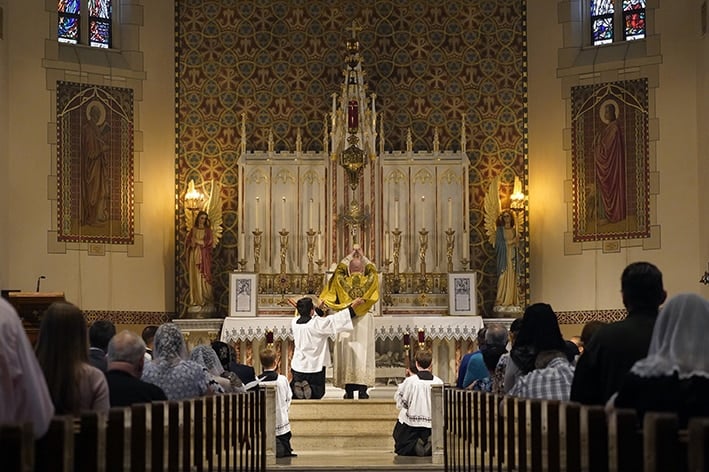
Can you tell me what the new regulations issued by Pope Francis for the celebration of the traditional Latin Mass will mean for those of us who attend it regularly, or at least from time to time?
With his document Traditionis custodes, issued on 16 July 2021, Pope Francis sought to heal divisions in the Church which certain bishops had reported arising in some communities using the traditional Latin rite.
In 2020 the Pope asked the Congregation for the Doctrine of the Faith to circulate a questionnaire to the bishops regarding the implementation of Pope Benedict’s 2007 document Summorum Pontificum. That document granted ample faculties to celebrate the traditional Latin rite of the Mass, using the 1962 missal issued by Pope John XXIII.
In his letter to the bishops accompanying Traditionis custodes, Pope Francis described his reaction to the findings of the survey: “The responses reveal a situation that preoccupies and saddens me, and persuades me of the need to intervene. Regrettably, the pastoral objective of my Predecessors, who had intended ‘to do everything possible to ensure that all those who truly possessed the desire for unity would find it possible to remain in this unity or to rediscover it anew’, has often been seriously disregarded.
An opportunity offered by St John Paul II and, with even greater magnanimity, by Benedict XVI, intended to recover the unity of an ecclesial body with diverse liturgical sensibilities, was exploited to widen the gaps, reinforce the divergences, and encourage disagreements that injure the Church, block her path, and expose her to the peril of division.”
To say that the Council betrayed the Tradition and the true Church is to doubt the Holy Spirit himself … even possibly heretical.”
In particular. he says he is “saddened that the instrumental use of Missale Romanum of 1962 is often characterised by a rejection not only of the liturgical reform, but of the Vatican Council II itself, claiming, with unfounded and unsustainable assertions, that it betrayed the Tradition and the ‘true Church’… To doubt the Council is to doubt the intentions of those very Fathers who exercised their collegial power in a solemn manner cum Petro et sub Petro in an ecumenical council, and, in the final analysis, to doubt the Holy Spirit himself who guides the Church.”
As Pope Francis says, to doubt the teachings of the Second Vatican Council and to say that the Council betrayed the Tradition and the true Church is to doubt the Holy Spirit himself. It is not clear how many people in fact have this attitude, but the attitude is certainly very misguided, even possibly heretical.
In view of those findings the Pope introduced the new norms, which restrict the use of the Missal of 1962. Among those norms are the following:
- Whereas before, every priest in the world was authorised to use the 1962 missal freely at his own discretion, now priests must seek permission from their bishop to use it.
- Masses celebrated with the 1962 missal, from now on, are never to be celebrated in a parish church, something which has been done commonly until now, even in cathedrals, for the benefit of parishioners. It should be borne in mind that there are very few churches which are not parish churches.
- The bishop can now decide whether or not to allow an existing group using the 1962 missal to continue doing so, and he is not to authorise the establishment of any new groups.
- Priests ordained from now on who wish to celebrate Mass with the 1962 missal must seek permission from the diocesan bishop, who is to consult the Holy See before granting the permission. And priests who already use this missal must request permission from their bishop to continue doing so.
- It will be up to each bishop to decide how he wants to implement these norms and, depending on what he decides, the traditional rite will be more or less available. It is possible that in many places the faithful will have to travel further to attend a traditional Mass.
As many commentators have said, these norms are a matter of Church discipline, not of doctrine, and they may be changed by a future Pope.
Related Articles:
Fr John Flader: Can I attend the Latin Mass?
Australia’s bishops respond to Francis’s motu proprio on the Latin Mass
